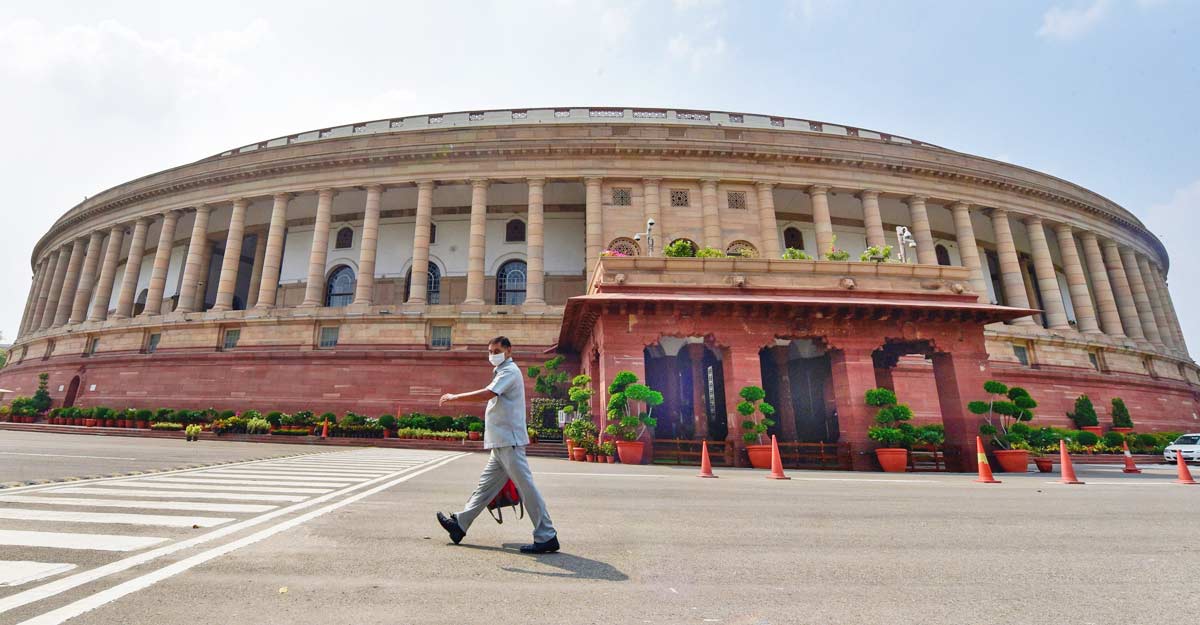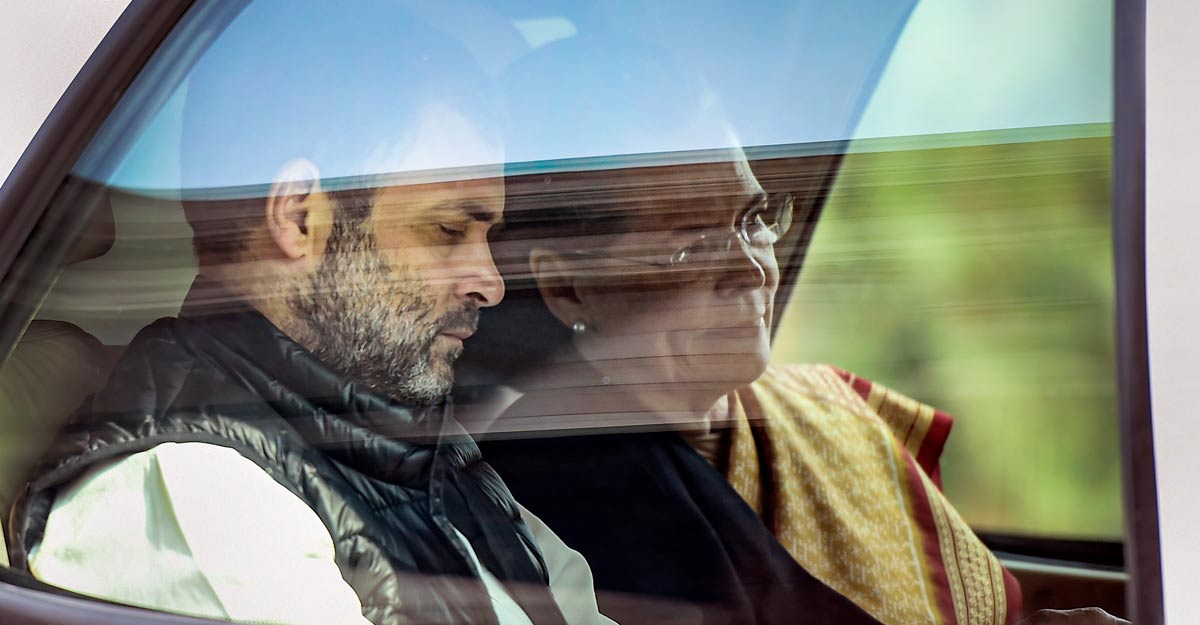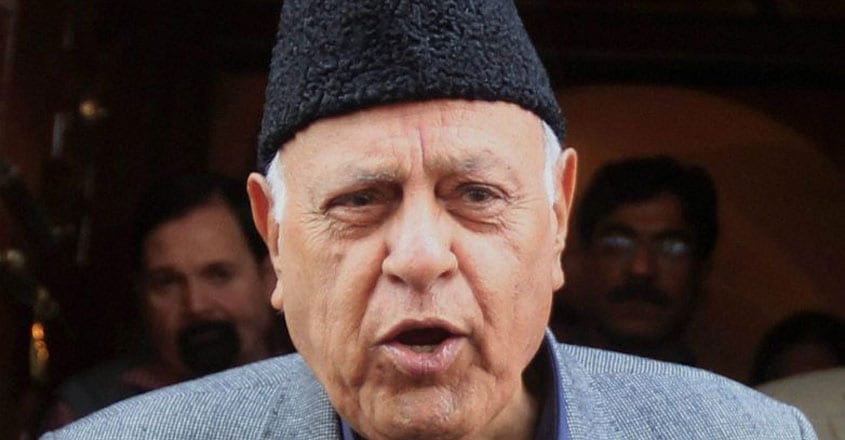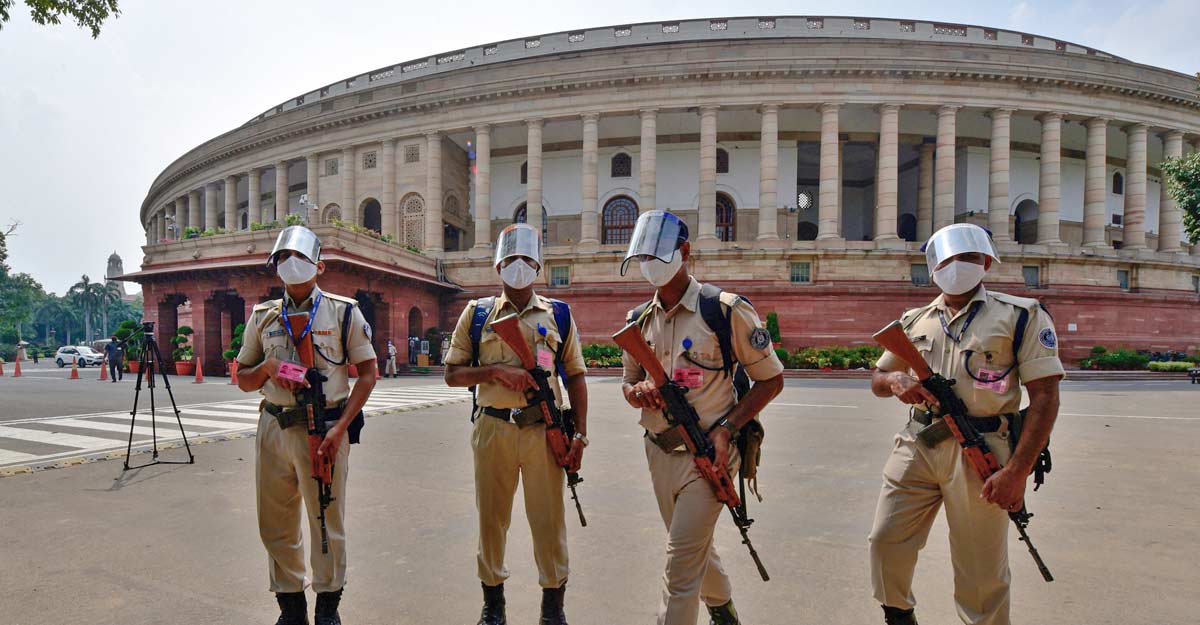
Monsoon session of Parliament begins amid COVID-19: LAC standoff, COVID, economy in focus
by Onmanorama StaffNew Delhi: The issues of ongoing India-China standoff along LAC, handling of the coronavirus pandemic and economic slowdown are likely to dominate the Monsoon session of Parliament which began on Monday, with the opposition demanding a discussion on them, while the government has listed nearly two dozen new legislations for passage during the COVID-curtailed proceedings.
The session began on Monday with the Lok Sabha paying tributes to former President Pranab Mukherjee, a sitting MP and 13 ex-parliamentarians who died in the recent past.
The first-of-its-kind Monsoon session being held amid the COVID-19 pandemic saw members sporting masks and following social distancing guidelines while attending the proceedings.
As soon as the House assembled for the first time since the coronavirus outbreak, Lok Sabha Speaker Om Birla paid glowing tributes to the departed leaders and security personnel who have laid down their lives while protecting the nation since March.
Birla also remembered "Corona warriors" like doctors, nurses, sanitation workers, police personnel and voluntary workers who died while fighting the pandemic.
Apart from Mukherjee, the House paid tributes to sitting MP from Tamil Nadu H Vasanthakumar, eminent vocalist Pandit Jasraj, former MPs Gurdas Singh Badal, Nepal Singh, Ajit Jogi, P Namgyal, Paras Nath Yadav, Madhav Rao Patil, Haribhau Madhav Jawale, Saroj Dubey, Lalji Tandon, Kamal Rani, Chetan Chauhan, Surendra Prakash Goel and Raghuvansh Prasad Singh.
The speaker then adjourned the House for an hour, after about 20 minutes of business.
Prime Minister Narendra Modi, Defence Minister Rajnath Singh, Finance Minister Nirmala Sitharaman, Law Minister Ravi Shankar Prasad, Congress leader Adhir Ranjan Chowdhury, DMK leader T R Baalu, National Conference leader Farooq Abdullah and NCP leader Supriya Sule were among those who were present in the House.
The 18-day session is being held amid unprecedented precautionary measures against COVID-19 due to a continuing spike in cases. India witnessed a single day spike of 92,068 COVID-19 cases, and 1,136 fatalities taking the country's virus caseload to 48,46,424 and death toll to 79,722 on Monday.
The government has listed 23 new legislations for consideration and passage including 11 bills replacing ordinances. There also 20 other bills pending in either Lok Sabha or Rajya Sabha. Several of the opposition parties are likely to oppose four of the bills replacing ordinances relating to the farm sector and the banking regulation amendments.

Stormy session likely
The opposition is seeking to corner the government on its handling of the standoff with China at the Line of Actual Control in Ladakh, the COVID-19 situation, economic downturn and unemployment, and is pressing for discussions on these issues.
The Congress and other opposition parties raised these demands in the first business advisory committee (BAC) meeting for Lok Sabha chaired by Speaker Om Birla today, but the time for these discussions is yet to be allocated.
The BAC for Lok Sabha will be held again on September 15 afternoon to further discuss the issues to chalk out the business schedule for the first week.
The same demands were raised by the Congress in the BAC for Rajya Sabha too.
Rajya Sabha will also hold the election to the post of Deputy Chairman, while Lok Sabha will take up 'The Homoeopathy Central Council (Amendment) Bill, 2020' and 'The Indian Medicine Central Council (Amendment) Bill, 2020', to replace the ordinances issued earlier.
Parliamentary Affairs Minister Pralhad Joshi said that the government is ready to discuss all issues decided by the BAC and has appealed to all parties for their cooperation.
He said a meeting of leaders of various parties would be held on Tuesday on whether a discussion on the India-China border issue will be held.
Leader of Opposition in Rajya Sabha Ghulam Nabi Azad said the Monsoon session is being held amid fear and unprecedented times due to COVID.
He said, "India and China are in a conflict situation in Ladakh and there is tension, GDP is tumbling and inflation is rising".
"We want to discuss many issues in Parliament that the country and its citizens would want to hear about," he said.
Congress leader in Lok Sabha Adhir Ranjan Chowdhury said the Congress has demanded that there should be a discussion on the situation at the border and Chinese aggression, besides on COVID-19 pandemic, the economy and joblessness, but the government is yet to give any assurance.
"We have urged the government that our voice should be heard in Parliament," Chowdhury told reporters.
Congress leader Jairam Ramesh said the Congress and other opposition parties will oppose four of the 11 legislations the government proposes to bring in the session to replace the ordinances issued earlier and expect Prime Minister Narendra Modi to reply to their concerns.
Ramesh said the Congress is in touch with other like-minded parties and has decided to strongly oppose the three agriculture-related legislations and the amendment to the Banking Regulation Act in both houses of Parliament.
"We hope the Opposition would get an opportunity to speak and serious national issues would be discussed. We expect the prime minister to be present in Lok Sabha and Rajya Sabha and give a reply to the questions raised by us," he said.

Congress president Sonia Gandhi will miss a large part of the session as she left for the US on Saturday for a routine medical check-up and will return after a fortnight.
She is accompanied by her son and party leader Rahul Gandhi, who is likely to return within a week to lead the Congress' offensive in Lok Sabha.
In a statement, the CPI(M) said it is opposed to 11 ordinances promulgated by the government during the period of lockdown.
"Some of these, particularly concerning Indian agriculture, are extremely dangerous and damaging to our farmers, Indian agriculture and India's economic sovereignty. The CPI(M) has moved a notice for statutory resolutions opposing these ordinances and demanding their withdrawal in both Houses of Parliament, it said.
Shiv Sena leader Sanjay Raut has also demanded that there should be a discussion on the border conflict with China, COVID, GST dues and unemployment.
On Tuesday, two bills for curtailment of salaries of the prime minister and ministers, and MPs respectively will be passed without discussion as the opposition has no objection to them, sources said.
They also said that there will be no Question Hour during the session, but there will be Zero Hour for 30 minutes.
While on the first day of the session on Monday, Lok Sabha will sit in the morning from 9 AM to 1 PM, Rajya Sabha will sit in the evening starting at 3 PM on Monday. On the rest of the days, Rajya Sabha will sit for four hours in the morning and Lok Sabha in the evening.
Farooq to attend his first parliament session after JK special status withdrawn
Lok Sabha MP and former Jammu and Kashmir chief minister Farooq Abdullah will attend his first Parliament appearance after the abrogation of provisions of Article 370.

The National Conference president, who arrived here Sunday, is likely to be in focus since he was under detention during the last two sessions, during which several opposition leaders had demanded the government allow him to attend the proceedings.
The veteran politician from the Kashmir valley is keen to raise the Jammu and Kashmir issue during this session, NC leaders said.
On August 5 last year, a bill for re-organisation of Jammu and Kashmir was tabled in Parliament and the 82-year-old was taken into preventive custody.
Later, in September that year he was booked under the stringent Pubic Safety Act (PSA), which the government revoked in March this year.
COVID protocol in force
Parliament is fully prepared for the 18-day Monsoon Session under the shadow of the coronavirus pandemic with many firsts, including sitting of the two Houses in shifts without any off day, entry only to those having a negative COVID-19 report and compulsory wearing of masks.
In run-up to the session, while over 4,000 people including MPs and staff have been tested for COVID-19, most parliamentary operations have been digitalized, entire premises sanitised and doors made touch-free.

The first-of-its-kind Monsoon Session will see Lok Sabha and Rajya Sabha sitting in two different shifts, while special seating arrangements have been made for MPs in adherence to social distancing guidelines.
Barring on the first day, Rajya Sabha will convene in morning shift from 9 am till 1 pm, and Lok Sabha in evening shift from 3 pm to 7 pm. The chambers of both houses along with their respective galleries will be used for sitting of the members in each shift.
In between the two shifts, the entire complex will be sanitised.
The chambers of both houses and the galleries will be used for each of the session of Lok Sabha and Rajya Sabha and big screens have been put up to enable members to see the proceedings all over the Parliament.
The DRDO will also provide multi-utility COVID-19 kits to all MPs.
Each kit will contain 40 disposable masks, five N-95 masks, 20 bottles of sanitisers of 50 ml each, face shields, 40 pairs of gloves, a touch-free hook to open and close doors without touching them, herbal sanitation wipes and tea bags to enhance immunity.
The two houses together have more than 780 members at present. The Health Ministry has also suggested that the movement of Members of Parliament in chambers of both the houses can be made unidirectional to avoid face-to-face interactions.
The Ministry will make available short video clips to all MPs on awareness about COVID-19 infections and the benefits of wearing masks, etc.
Touchless sanitisers will be kept at 40 different places within the Parliament House complex, and emergency medical teams and ambulances will also be stationed.
Frequent sanitisation of the entire parliament complex will also be carried out, while arrangements have been made to sanitise various parliamentary papers as well as footwear and cars of MPs, officials said.
Frisking of people will also make way for touch-less security scanning, while thermal scanning will also be totally touch-free.
It has also been decided that air of air conditioners will be exchanged six times every day to avoid any possible infection.
The provision of ultraviolet boxes has also been made to sanitise various parliamentary papers handled by the presiding officers and members. Arrangements are also being made for sanitisation of footwear and cars used by the members and those provided by the Secretariat by providing mats of required dimensions soaked in Hypochloride gel placed in troughs.
Marshals will also wear masks and face shields.
(With inputs from PTI)